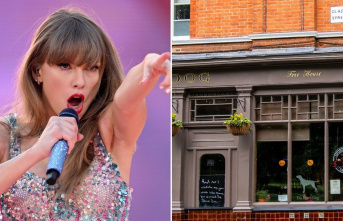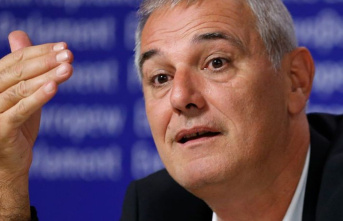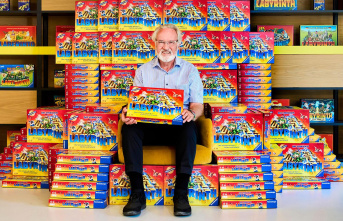In 2017, stand-up comedian and podcaster Felix Lobrecht (34) told the story of young people in the Berlin district of Gropiusstadt in 2003 from the perspective of 15-year-old Lukas in his debut novel "Sonne und Beton". big screen and impressively brings the rough world of the social hot spot to life.
The film accompanies Lukas (Levy Rico Arcos) and his buddies Gino (Rafael Luis Klein-Heßling) and Julius (Vincent Wiemer), who have no money, are unlucky in love and have a lot of stress at home and at school through the Berlin district of Gropiusstadt stripe One day when they want to buy weed in the park, they get caught between rival dealers.
Lukas takes a beating and the dealers want 500 euros protection money from him. In order to raise the almost impossible sum, Lukas' new classmate Sanchez (Aaron Maldonado-Morales) comes up with an idea. The boys could just break into the school, steal the new computers from storage and sell them. But what is the best way to sell stolen computers? The friends supposedly find help from Lukas' brother...
The young people in the film are between 14 and 15 years old and on the threshold of growing up they not only have to put up with fists, but much more every day. In a world full of hopelessness, without support from the family and yet dreaming of a better future (keyword: Abitur) with more money in their pockets, they are, whether they like it or not, in a world full of drugs, problems in the family, thrown in by rival gangs and parties stormed by the police.
They swim with the current, because nothing else is shown to them. In order to survive in this world, they become criminals themselves, boxing and skipping school, which is completely chaotic anyway. Above all, they can count on their friendship, which has been formed and strengthened through numerous shared experiences in the harsh environment.
In order to implement the story as realistically and comprehensibly as possible, the filmmakers not only relied on shooting in the original setting in the Neukölln district, but also on a large-scale casting phase beforehand. Over 5,000 young people applied themselves or were discovered by streetcasters and sent through several rounds - the work was rewarded. In the end, Levy Rico Arcos (Lukas), Vincent Wiemer (Julius), Rafael Luis Klein-Hessling (Gino) and Aaron Maldonado-Morales (Sanchez) prevailed, all of whom are in front of the camera for the first time and therefore made their convincing cinema debut give. They embody their roles credibly, each of which faces very different challenges, especially in the family. Thanks to the expanded film perspective, which no longer only shows the point of view of the main character Lukas, as in the book, the characters of the boys who are friends are given more space, which increases the intensity of the film.
Jörg Hartmann (53) as Lukas' father and Franziska Wulf (born 1984) as Sanchez' mother also impressively show the parents' perspective. The adults move between financial hardship and the fact that they have to accept helplessly the hard world they send their children into every day, reacting with incomprehension or advice à la "the smarter ones give in" that seems useless to the young people.
The picture of the merciless capital with its various characters is completed by extras cast on site and numerous hip-hop stars like Luvre47, who convinces as Lukas' brother Marco and at the same time contributed the appropriate title song to the film. In addition, Lucio101, Juju, Olexesh, NNOC or Azzi Memo are also part of the party, as well as a special guest in a dark apartment that has mutated into a techno cave...
Lobrecht, who grew up in Gropiusstadt himself, but deliberately leaves open in the book and in the film to what extent the plot is autobiographical, hired David Wnendt (born 1977), an experienced screenwriter for book adaptations ("Wetlands", "He's back there ") to his side. Together with him, he lets the places that he said he could see in front of him when writing the book from his own experience become reality on film, above all the concrete colossi of Gropiusstadt, which are bathed in the warm light of the scorching summer heat . The raw youth slang that already characterized the book is also essential for the film. The violence that prevails around the large housing estate is shown relentlessly, but not gimmicky.
The world of the early 2000s is also brought into the picture in great detail. Be it an MP3 or CD player playing German rap, the Cherry Coke that goes over the counter or mobile phones that send text messages in droves or become useless objects without batteries and credit - you immediately feel like you've been transported back to the Time without TikTok and Co. Despite all the problems presented, the film has other easy moments. The time they spend together, in which the young people forget their problems, fool around and talk about girls, lets you feel the deep friendship that gets them through difficult times and is a glimmer of hope in Gropiusstadt's often dreary everyday life.
The "Sun and Concrete" film adaptation is by no means only reserved for readers of the original book. Lobrecht and Wnendt have succeeded in condensing the story of the novel for the film and expanding it with new aspects. The debuting main actors bring the four boys with their fears, their anger, their worries and their brave coping with everyday life wonderfully to the screen. The drama, which in addition to the serious moments also has a lot of humor in store, provides a multi-layered cinema experience and, with its refreshingly different tone, makes a beneficial contribution to the diversity in the German cinema landscape.











